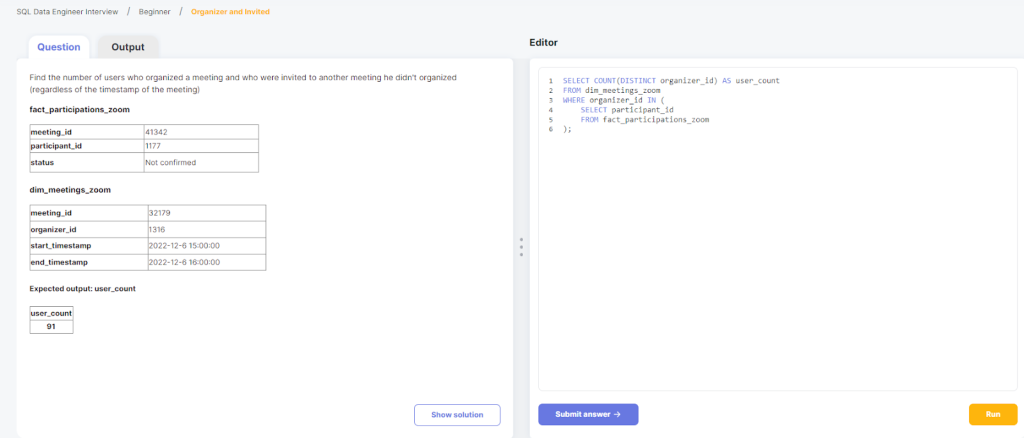SQL Data Engineer Interview
About SQL course
Our course is segmented into three comprehensive modules: Beginner, Intermediate, and Advanced, ensuring a progressive learning curve that caters to all proficiency levels.
The course, designed for SQL Data Engineer Interview preparation, starts with the Beginner level, focusing on basic principles for newcomers. It then progresses to the Intermediate level, where learners explore detailed techniques and methods specific to SQL engineering. Finally, it culminates at the Advanced level, diving deep into expert-level content, offering a thorough exploration of the most complex aspects of SQL data engineering. This structured approach ensures a deep and comprehensive learning experience for everyone, from beginners to seasoned professionals seeking to ace their interviews.
What you’ll learn
In the SQL Data Engineer Interview course at DE Academy, you will master the knowledge and strategies you need for a successful technical interview. Every lecture is meticulously curated to cover both basic and advanced topics. After each segment, we’ll reinforce your understanding with practice problems, ensuring you’re well-prepared and confident for your interview.
Real-World FAANG-Level Challenges:
Imagine launching a product that serves millions, even billions, of users. How do you discern which feature is most used? Or understand user behaviors across different continents? Such high-scale, complex problems are daily puzzles at companies like Facebook, Apple, Amazon, Netflix, and Google (FAANG). Dive deep with us into these real-life scenarios, exploring how SQL aids in unraveling user insights, optimizing product experiences, and making pivotal business decisions. We’ll dissect actual product challenges, demystify their intricacies, and employ SQL to craft solutions, offering a hands-on, in-the-trenches view of how the tech giants harness data.
Why Learn SQL?
- SQL integrates seamlessly with numerous platforms and tools, making it a universally recognized skill in tech domains. Its consistent syntax means learning SQL allows adaptability across various tech environments.
- With businesses relying on data for insights, SQL expertise makes you a vital asset, often leading to diverse roles, from Data Engineering to Analytics, with competitive rewards.
Interactive SQL Course Simulators

How Long Does It Take to Learn SQL?
The duration to grasp SQL varies based on individual aptitude, prior knowledge, and the depth of understanding one wishes to achieve.
Beginner – concepts in 1 to 2 weeks.
Intermediate – might require 2 to 3 weeks of dedicated learning, especially if you’re aiming to internalize the concepts and apply them practically.
Advanced – with regular practice and real-world application, one could expect to achieve proficiency in advanced SQL in 3 to 4 weeks.
Who Should Learn SQL?
- Aspiring Data Engineers
- Data Analysts & Scientists
- Database Administrators
- IT Professionals.
- Students
Why This Course?
We’re not here to overwhelm you with jargon, but to answer the pressing questions, to quench your curiosity. By journey’s end, you won’t just ‘know’ SQL; you’ll live it, applying it confidently in any digital endeavor.